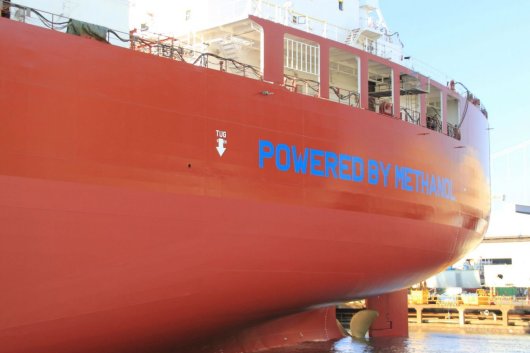Approval of methanol guidelines will release 'pent-up demand': Methanol Institute
Institute says IMO adoption of guidelines on ethyl and methyl alcohol fuels provides genuine alternative for 2030 compliance and beyond.
The Methanol Institute (MI) has welcomed the adoption by the IMO's Maritime Safety Committee of interim guidelines on the use of methanol as a marine fuel.
The guidelines enshrine ethyl and methyl alcohols as options for marine fuel - a milestone the institute believes will be a catalyst for more ship operators to consider methanol as a low carbon compliance option.
MI notes growing interest among owners and operators seeking a solution to cutting carbon emissions quickly and embracing renewables in the longer term. The institute says it is also working with shipyards to develop standard vessel designs for ships powered by methanol.
According to MI, 12 methanol-powered chemical tankers constructed to equivalent class rules are already in operation, with another 10 on order; and the institute expects the new guidelines to shorten the time to approval and even lower the cost of constructing tankers, bulkers and containerships using methanol as fuel.
The first bunkering Technical Reference for Methanol was published recently by Lloyd's Register and MI, with fuel suppliers gearing up to increase capacity for methanol bunkering volumes.
"Our work with shipowners, class societies, flag administrations and bunkering providers demonstrates there is pent-up demand for a low carbon fuel that can help owners meet their 2030 emission reduction targets at a fraction of the cost of an LNG powered vessel," remarked MI COO Chris Chatterton.
"With new methanol guidelines the industry truly has a choice that can help start to reduce emissions with the regulatory certainty it needs," Chatterton added.
The IMO approval comes as research by the IEA-AMF suggests conventional methanol can be a significant bridge fuel, lending itself as a base for increased blending of bio-methanol or renewable methanol going forward.
As the simplest alcohol with no carbon-to-carbon bonds, methanol has a 4:1 hydrogen to carbon ratio, which also makes it a key candidate for utilization as a hydrogen carrier, for example, in fuel cells.
The guidelines enshrine ethyl and methyl alcohols as options for marine fuel - a milestone the institute believes will be a catalyst for more ship operators to consider methanol as a low carbon compliance option.
MI notes growing interest among owners and operators seeking a solution to cutting carbon emissions quickly and embracing renewables in the longer term. The institute says it is also working with shipyards to develop standard vessel designs for ships powered by methanol.
According to MI, 12 methanol-powered chemical tankers constructed to equivalent class rules are already in operation, with another 10 on order; and the institute expects the new guidelines to shorten the time to approval and even lower the cost of constructing tankers, bulkers and containerships using methanol as fuel.
The first bunkering Technical Reference for Methanol was published recently by Lloyd's Register and MI, with fuel suppliers gearing up to increase capacity for methanol bunkering volumes.
"Our work with shipowners, class societies, flag administrations and bunkering providers demonstrates there is pent-up demand for a low carbon fuel that can help owners meet their 2030 emission reduction targets at a fraction of the cost of an LNG powered vessel," remarked MI COO Chris Chatterton.
"With new methanol guidelines the industry truly has a choice that can help start to reduce emissions with the regulatory certainty it needs," Chatterton added.
The IMO approval comes as research by the IEA-AMF suggests conventional methanol can be a significant bridge fuel, lending itself as a base for increased blending of bio-methanol or renewable methanol going forward.
As the simplest alcohol with no carbon-to-carbon bonds, methanol has a 4:1 hydrogen to carbon ratio, which also makes it a key candidate for utilization as a hydrogen carrier, for example, in fuel cells.

|
Swedish biomethane bunkered in Gothenburg
Test delivery performed by St1 and St1 Biokraft, who aim to become large-scale suppliers. |
|
|
|
||

|
Cockett to be closed down after 45 years
End of an era as shareholders make decision based on 'non-core nature' of Cockett's business. |
|
|
|
||

|
Petrobras confirms prompt availability of VLS B24 at Rio Grande
Lead time for barge deliveries currently five days. |
|
|
|
||

|
IMO approves pricing mechanism based on GHG intensity thresholds
Charges to be levied on ships that do not meet yearly GHG fuel intensity reduction targets. |
|
|
|
||

|
VARO Energy expands renewable portfolio with Preem acquisition
All-cash transaction expected to complete in the latter half of 2025. |
|
|
|
||

|
NYK trials biofuel in milestone coal carrier test
Vessel is used to test biofuel for domestic utility company. |
|
|
|
||

|
H-Line Shipping orders LNG bunkering vessel
Vessel with 18,000-cbm capacity to run on both LNG and MDO. |
|
|
|
||

|
How to engineer and manage green shipping fuels | Stanley George, VPS
Effective management strategies and insights for evolving fuel use. |
|
|
|
||

|
Swedish government bans scrubber wastewater discharges
Discharges from open-loop scrubbers to be prohibited in Swedish waters from July 2025. |
|
|
|
||

|
MAN Energy Solutions achieves 100% load milestone for ammonia engine
Latest tests validate fuel injection system throughout the entire load curve. |
|
|
|
||

